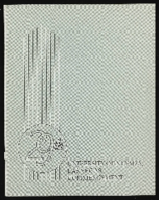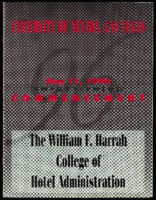Search the Special Collections and Archives Portal
Search Results
Marjorie Barrick Museum of Natural History Records
Identifier
Abstract
The Marjorie Barrick Museum of Natural History Records (1939-2003) detail the creation of the Marjorie Barrick Museum of Natural History in Las Vegas, Nevada founded by Richard H. Brooks, a professor of anthropology at the University of Nevada, Las Vegas. The records are comprised primarily of correspondence between Brooks and members of the Southwestern Anthropological Association (SWAA), the Society for California Archaeology (SCA), and the meetings and exhibitions of the Nevada State Museum. The collection also contains financial statements that describe expenses for supplies, research, and excursions. Also included are anthropological, archaeological, and historical publications, as well as administrative files and Richard Brooks' correspondence with the Nevada Archaeological Survey (NAS). The collection also includes architectural floor plans for the Classroom and Physical Education, the original space that was converted into the museum in 1980, and plans for the redesign of the Barrick Museum and the Harry Reid Environmental Research Center addition.
Archival Collection
Donna Andress Papers
Identifier
Abstract
The Donna Andress Papers (1890-2021) contain the personal papers of Donna Andress, a longtime resident and activist in Southern Nevada. Materials include correspondence and newspaper clippings from the Nevada Welfare Committee, on which Andress served as chairperson during the 1970s, in addition to pamphlets and newsletters from various Nevada historical organizations and committees. The papers reflect her involvement with community organizations throughout Southern Nevada.
Archival Collection
Kenneth Giles Professional Papers
Identifier
Abstract
The Kenneth Giles Professional Papers (1964-2001) contain documents and visual material related to Giles's time as an Environmental Radiation Monitor for the Environmental Protection Agency (EPA) at the Nevada Test Site (NTS). Photographic slides, film, and digital images depict the general flora and fauna throughout the area surrounding the NTS. Visual materials also document specific mule deer and steer surveillance and testing at the EPA Farm located within the NTS. The collection also contains environmental reports written or collected by Giles, government documents, pamphlets, and newspaper clippings related to environmental monitoring and Giles's work at NTS. A small portion of the collection documents his brief role providing monitoring support at Three Mile Island in Pennsylvania in 1979. Note: Some images may be of a graphic or disturbing nature and may not be suitable for some users. Photographs may contain scenes of animal testing or other objectionable imagery.
Archival Collection
Christie Young Papers
Identifier
Abstract
The Christie Young Papers are comprised of Young's personal papers, journals, and photographs between 1982 and 2011. The journals document Young's arrival to Las Vegas, Nevada and her involvement in several nascent Las Vegas lesbian, gay, bisexual, transgender, and queer (LGBTQ) organizations from 1982 to 1985, such as UNLV's Lesbian and Gay Academic Union (LGAU). The collection includes materials related to her life in San Diego, California from 1985 to 1995 and typed transcripts of all journal entries that relate to the Las Vegas LGBTQ community. The collection also includes photographic slides and prints documenting Young's involvement with LGAU and events in the Las Vegas LGBTQ community.
Archival Collection
Eileen Brookman Papers
Identifier
Abstract
The Eileen Brookman Papers date from 1934 to 2002 and document Brookman's personal life and political career. Brookman was active in the Las Vegas Jewish community. Personal papers include programs from B'nai B'rith, scrapbook materials, correspondence, and photographs. The collection includes documentation from the White House Conference on Aging. She served several terms in the Nevada State Assembly from 1967 to 1977 and again from 1987 to 1989. Political materials include legislative information, bumper stickers, election returns, and newspaper clippings.
Archival Collection
Stella Champo Iaconis oral history interviews
Identifier
Abstract
Oral history interview with Stella Champo Iaconis conducted by Kay Long on May 14, 1997, May 21, 1997, May 26, 1997, and September 22, 1997 for the Women's Research Institute of Nevada (WRIN) Las Vegas Women Oral History Project. Iaconis opens her interviews discussing her difficult upbringing and life on a ranch in Las Vegas, Nevada with her dad in the 1910s and 1920s. Iaconis then describes her experiences as a waitress in Las Vegas. As the interviews continue, Iaconis discusses Block 16 and sex work, the Helldorado Days, and life in 1930s Las Vegas. Iaconis ends the interview talking about her father and his career as a miner; her many husbands; and her personal history in Las Vegas.
Archival Collection

University of Nevada, Las Vegas (UNLV) 38th commencement program
Date
Archival Collection
Description
Commencement program from University of Nevada, Las Vegas Commencement Programs and Graduation Lists (UA-00115).
Text

University of Nevada, Las Vegas (UNLV) 29th commencement program
Date
Archival Collection
Description
Commencement program from University of Nevada, Las Vegas Commencement Programs and Graduation Lists (UA-00115).
Text

University of Nevada, Las Vegas (UNLV) William F. Harrah College of Hotel Administration 33rd commencement program
Date
Archival Collection
Description
Commencement program from University of Nevada, Las Vegas Commencement Programs and Graduation Lists (UA-00115).
Text

Gene Noboru Nakanishi oral history interview: transcript
Date
Archival Collection
Description
Oral history interview with Gene Noboru Nakanishi conducted by Ayrton Yamaguchi, Cecilia Winchell, and Stefani Evans on April 2, 2021 for Reflections: The Las Vegas Asian American and Pacific Islander Oral History Project. Gene Nakanishi shares his detailed family history from both his father's and his mother's families. He discusses his paternal grandfather's work on the Union Pacific Railroad, the family's internment in Wyoming during World War II, and his father's release from the camp by joining the United States Army Signal Corps. Nakanishi also talks of his maternal grandfather who was of the Bushido ("warrior") class in Osaka, Japan, and his grandfather's work with Christian missionaries. He shares details of his mother's restaurant employment in Los Angeles and her opening of Osaka Japanese Bistro in Las Vegas in 1969. Nakanishi also talks about being born and raised in Las Vegas, his musical schooling at Berklee College of Music in Boston, and his graduate education at Harvard University. He discusses his work as a band teacher for the Clark County School District, his involvement in the Idyllwild Arts Summer Program band camp, and his interests in jazz music.
Text
